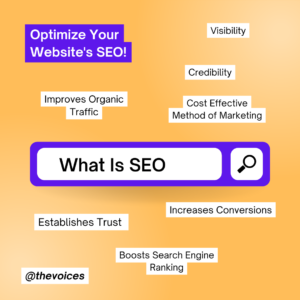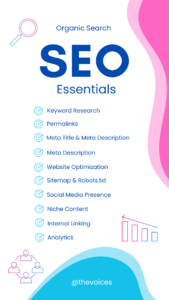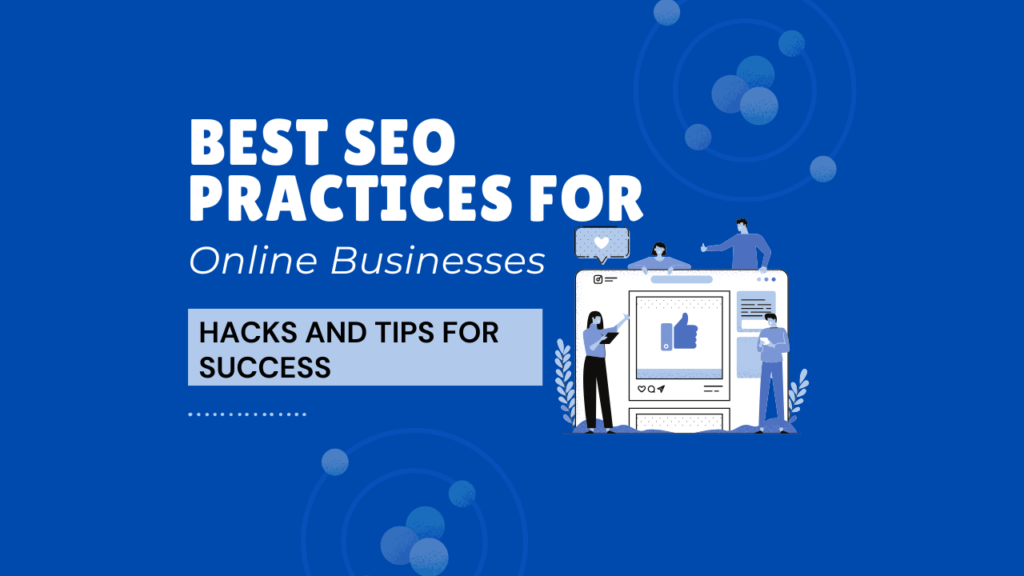Search Engine Optimization, largely known as SEO, has become necessary for online businesses. Whether a startup, mid-level company, or large corporation, having the best SEO practices plays a vital role in boosting online visibility, traffic, and conversions. An effective online presence is what every business needs to stand ahead in today’s competitive digital age. Here is an easy guide for SEO, including hacks and tips that can help your business rank better on the Search Engine Result Pages (SERPs).
The Voices‘ student reporter deep-dives into the basics of SEO and best SEO practices to improve a website’s ranking on any search engine.
Why is SEO important? What’s the best SEO practice for websites?
Here are the ways SEO helps businesses:
- Boosts Search Engine Ranking: Search Engine Optimization helps a website rank better on search engines, which increases its visibility and chances of conversion.
- Improves Organic Traffic: SEO brings more visitors to the website without the need to spend on ads. Best SEO practices are an effective way to rank higher on search engines and boost organic traffic.
- Establishes Trust & Credibility: Ranking on SERP enhances a brand’s credibility online, which in turn establishes more trust among potential customers.
- Cost-Effective Method of Marketing: Organic SEO is more affordable than other marketing methods like hoardings, etc. It brings long-term results without denting the pocket, leaving aside Pay Per Click (PPC) that adds to expenses.
- Better Customer Experience: Technical SEO improves navigation, mobile friendliness, site speed, and other aspects, providing an enhanced experience to target customers.
- Increases Conversions: One of the best SEO practices is developing an effective targeted keyword strategy that pulls interested visitors to the target, increasing the chances of conversions.

Best SEO Practice: How do you rank on SERPs?
Certain SEO elements enhance a website’s effectiveness, making it rank better on the search engines. These are the following:
Permalinks
Once the website is ready, you need to check the permalinks. A permalink is the URL of the website page being created. For example, if one is adding a blog to the website or a basic page, one needs to check the permanent link of this page. Permalinks are essential to SEO as they help search engines track the page contents, which then directs visitors to the website.
- Add a primary keyword to the permalink for a better user experience.
- URLs must be short and explanatory, like yourwebsite.com/seo-online-business. However, it can also automatically be http://yourwebsite.com/?p=145, which you must change.
- Avoid using stop words like “of”, “the,” “or” “and”.
Meta Title and Description
Meta Title: It’s the headline that appears on the SERPs (search engine result pages) and is clickable.
- Primary keywords should be included in it, typically at the beginning.
- It should be 60 characters long.
- Try to make it highly compelling to get more clicks.
Meta Description: This is the short text that appears below the meta title on the SERPs. It gives a summary of the page contents to the visitor and helps search engines understand the content of the webpage.
- Character limit for this is 160, you must stick to it.
- Use language that compels the visitors to click.
- Always include the primary keyword.
Descriptive meta details are one of the best SEO practices to help a website rank better.
Sitemap
It’s a file that contains a consolidated list of website pages. A sitemap is submitted to SERPs for indexing, which then crawls all the listed pages of the website. This plays a key role in “How to make your site rank.” Two types of sitemaps have a role to play. One is an XML Sitemap that displays the website’s structure to the search engines, while the other is an HTML Sitemap that enhances user navigation.
- All the listed pages in sitemaps are crawled and indexed by SERP’s.
- They improve the visibility and ranking of the website.
- They are important for heavy websites with more number of pages.
Robots.txt
The role of a robots.txt file is to send a message to search engines about essential pages to crawl. It can also list pages that need to be ignored.
- It lists important pages for indexing, making them accessible.
- It blocks irrelevant pages like duplicate content or admin & login pages.

Quick SEO Tips and Hacks for Online Businesses
If you wish to find answers on how to use SEO effectively, then these below tips and hacks will help in different types of business:
Beginners
Below are some quick hacks for small businesses and startups to help them get their websites ranked quicker on the SERPs.
- Good Keyword Research: Use free keyword search tools like Google Keyword Planner to find keywords with higher search volume and low competition.
- Optimize Your Website: Make sure your website is mobile-friendly and easy to navigate. Fast loading speeds are also essential to a better user experience.
- Add Niche Content: Content is key on the internet, and you need to make sure that you add quality niche content that visitors are looking for. Make your blogs informative and add FAQs wherever possible.
- Include a GMB (Google My Business) page: Having a Google My Business place increases your local visibility. GMB pages build your credibility locally and improve local ranking.
- Earn Quality Backlinks: Submit your website to bookmarking websites and online directories. Collaborate with other bloggers in your niche and exchange backlinks. Backlinks improve your credibility on SERPs.
- Use Internal Linking: Interlinking important pages is essential for search engines and your potential customers.
- Create & Submit Sitemap: Submit XML sitemap in Search Console so Google’s crawler can index all your important pages.
Mid & Higher Level Businesses (Growing Brands)
- Improve Technical SEO: Fix broken links, optimize site structure, and use schema markup for effective ranking.
- Advanced Keyword Strategies: Use long-tail keywords to rank better.
- Utilize Social Media Platforms: Share niche content and engage with your audience.
- Use A/B Testing: Try different meta titles, descriptions, and call-to-action for better results.
- Track SEO Performance & Change Strategies: Google Analytics and Search Console should be your go-to places for analysing and modifying your strategies.
- AI Automation: AI driven SEO tools can provide great support.
SEO is a one-stop solution for ranking better on SERPs. Different strategies can help drive more traffic to your website, which can be a great support in launching and scaling up your business online. But remember, search engine optimization is an ongoing process, so make sure to utilize changing algorithms for long-lasting digital success. Begin with the basics and continue to refine your approaches while you proceed forward. An effective SEO strategy can always bring online success.
Copyeditor: Aaryanshi Mohan

